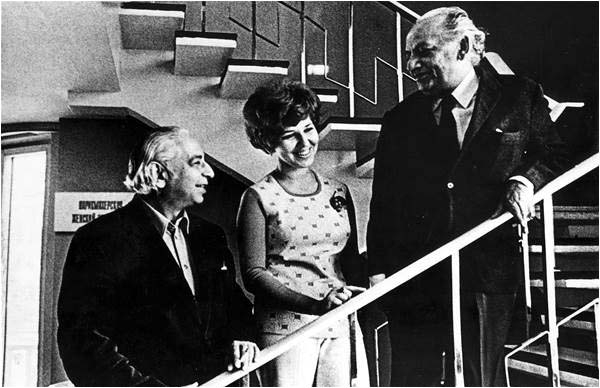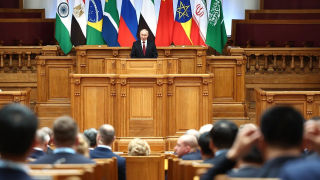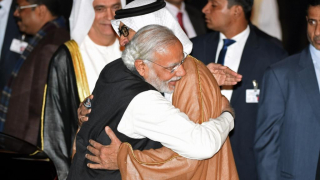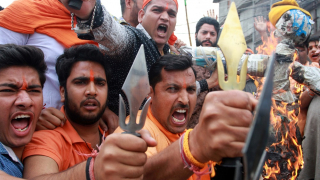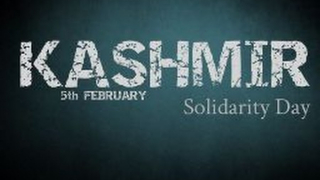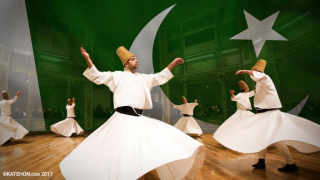FAIZ: HOW A LENIN PEACE PRIZE WINNER BECAME AN OUTCAST IN MODI’S INDIA
14.01.2020
Unfortunately, Indian Government under the Bharatiya Janata Party (BJP) and Rashtriya Swayamsevak Sangh(RSS) ideology has passed discriminatory laws targeting the minorities, especially Muslims. During the charade of anti and pro National Register of Citizens(NRC) and Citizenship Amendment Act(CAA) debate, one of the leading poets of South Asia have become a target of hate and admonition.
Faiz Ahmed Faiz is that poet. We have recently done a piece on this issue for Pakistani and Indian audience and thought of sharing our thoughts in international forums like Geopolitica Russia for a healthy debate. Taking help from extracts of this article and our research on Faiz Ahmed Faiz’s place in Russian literature, an effort is being made to put across the view in a historical and literary context.
As protests in India against NRC and CAA spread across India, people with conscience have been rallying to support the communities affected by the new law, mainly Muslims. The protests have been joined by civil society, youth, academia, Muslim women, Dalits, Adivasies, some opposition parties and lately Bollywood.
The campaign and narrative against NRC and CAA has many shades and colors, targeting the RSS’ saffron agenda and supporting Indian constitution. As normal in such protests, the sloganeering and ‘virodh’(protests) has taken help from flamboyant and legendary poets, especially from the left and progressives.
Faiz Ahmed Faiz was a natural choice; how could the crowd miss his zealous poems of hope and revolt. No wonder ‘Ham Dekhein Gay’(We will Witness) became an instant hit and spread like wild fire across India.
From the libraries of prestigious universities like Jawharlal Nehru University(JNU) and Indian Institute of Technology(IIT) Kanpur to footpaths of Red Fort and from the thatch huts of Chattisgarh to Abaaya clad Muslim women squatting in Shaheen Bagh for the last four weeks, ‘Hum Dekhien Gay’ is resonating like an orchestra of hope.
Faiz’s famous poem has kicked up a storm in India and RSS ideologues and leaders have described it as anti-Hindu. This growing poison in Indian society and absurd logic of RSS is putting Faiz Ahmed Faiz on trial. As reported by Huffington Post on 2nd Jan, IIT-Kanpur has formed a committee to inquire into a complaint against the recitation of Faiz Ahmed Faiz’s noted poem ‘Hum Dekhenge’ on campus by students to express solidarity with their peers at Jamia Milia Islamia, the institute’s Deputy Director Manindra Agarwal said.
An IIT-K student sang the poem ‘Hum Dekhenge’ by Faiz, an eminent poet, against which a complaint was filed by Dr Vashimant Sharma, a temporary faculty member, and about 16 others including faculty members and students. The written complaint filed by them with the IIT Director states that the poem had some wordings that could hurt the sentiments of Hindus, Agarwal said.A committee of six members was established, to investigate the matter. Some students have been questioned, while the others will be questioned after they return to the institution after the holidays. The objection seems to be on two of the verses where Faiz says, “Jab Arze Khuda Ka Kabbay say sab but uthwaay jainge”(When the Idols of power are thrown out of Kaaba). Renowned poet and Bollywood song writer Javed Akhtar said that describing Faiz’s poem as anti-Hindu was absurd and funny. But he had to painstakingly appear in many interviews and blogs to try convince the RSS bhakts that Faiz was a leftist and revolutionary poet, who fought against dictatorship in Pakistan and the poem had a context and metaphor to express his feelings and emotions.
Similar effort was made by Barkha Dutt in her interview with Faiz’s grandson Dr Ali Madeeh Hashmi,where the Indian audience was communicated about Faiz’s universal appeal and his efforts for peace and fight against dictatorship. Barkha Dutt acknowledged that it was almost embarrassing to say that Faiz was in middle of an absolutely bizarre controversy in India.
Coming back to persona of Faiz Ahmed Faiz,he was a Pakistani Marxist and declared as one of the most celebrated writers of the Urdu language in Pakistan, Russia and even in Europe and North America.
Born in Punjab, India, Faiz went on to study at Government College and Oriental College. Served in the British Indian Army. Faiz became the editor to The Pakistan Times and a after Pakistan’s independence and a leading member of the Communist Party before being arrested in 1951. After four years Faiz was released and became a notable member of the Progressive Writers' Movement and eventually an aide to Bhutto administration, before being self-exiled to Beirut.
Faiz was an avowed Marxist, and was decorated with the Lenin Peace Prize by the Soviet Union in 1962. His work remains influential in Pakistan literature and arts. Faiz's literary work was posthumously publicly honored when the Pakistan Government conferred upon him the nation's highest civil award, Nishan-e-Imtiaz, in 1990. Faiz was the first Asian poet to receive the Lenin Peace Prize, awarded by the Soviet Union in 1962.
During the Lenin Peace Prize ceremony at the grand Kremlin hall in Moscow, Faiz acknowledged the Russian government for conferring the honor, and delivered an acceptance speech, which appears as a brief preface to his collection Dast-i-tah-i-Sang (Hand under the rock):
It may be interesting to note that Aleksandr Gelyevich Dugin and Faiz have something in common for humanity and love for indigenous culture. Both believe that foundations of human society are based upon respect for justice, equality, freedom and the welfare of all creeds and not through the Capitalist ideology being imposed by the Western school of thought.
Faiz was a good friend of Soviet poet Yevgeny Yevtushenko who once said "In Faiz's autobiography... is his poetry, the rest is just a footnote". Indian biographer Amaresh Datta, compared Faiz as "equal esteem in both East and West".
Coming to present times and Faiz’s lovers in Russia, one of the authors of this article Adeela Naureen had the honor to meet Dr Ludmila Vasileva while accompanying Pakistani Media delegation to Moscow in Sep 2018.The charming Ludmila talked at length about challenges faced by Urdu language and how can Pakistan and Russia work together to help its natural growth. Dr Ludmila communicates in Shusta (eloquent) Urdu and mesmerizes the Urdu speaking audience through her command on the language and her deep research in Urdu.
Dr Ludmila is also an ardent researcher on Faiz Ahmed Faiz, while surfing the internet we came across two exclusive interviews of Dr Ludmila Vasileva; one by Raza Syed at Finsbury Park London on 12 September 2017 and second Dr Ali Madeeh Hashmi, the grandson of Faiz Ahmed Faiz, and Ms Faiza Hameed which was conducted at Lahore and appeared in the Friday Times on Ist Nov 20013,with the title “Urdu cannot Die”.
The Friday times published interview had an introduction of Dr Ludmilla and states, “Those who know and love Urdu poetry and literature recognize Dr. Ludmilla Vassilyeva’s name immediately. She is someone who, along with other notable non-native Urdu-scholars such as Dr. Frances Pritchett of Columbia University, the late Ralph Russell, and Natalia Prigarina, author of the seminal “Ghalib: A Creative Biography”, has done a tremendous amount of work in popularizing Urdu poetry and literature internationally. In addition, she was Faiz Ahmed Faiz’s interpreter and travel companion during his numerous sojourns in the Soviet Union over the course of 17 years from 1967 to 1984. She observed Faiz’s life and poetry from a privileged vantage point and also became a close friend. She has a PhD in Urdu and has written extensively (in both Russian and Urdu) on Faiz and Iqbal. She has also done translations of the poetry of Ghalib, Iqbal, Firaq, Josh, Majruh, Majaz, Ali Sardar Jafri and Faiz in addition to the prose of Qurratulain Haidar, Abul Kalam Azad and Joginder Pal, among others. Her book ‘Faiz Ahmed Faiz: Hayat aur Takhliqaat’ is the first literary biography of Faiz and was published to great acclaim by Oxford University Press in 2006”.
Why we are going into such details is to highlight to the general reader and especially the Russian audience that this great poet of the East who was awarded Lenin’s Peace Prize in 1962 has become an outcast in Mod’s India and there is a need to defend against the rising bigotry of Rashtriya Swayamsevak Sangh (RSS) which is gnawing at the roots of secular India.
In the picture published in Friday Times,Dr Ludmila is seen with Faiz in Alma Ata Conference 1973
Above picture is of the Book title by Dr Ludmila Vasileva titled,Parwarish e Loh o Qalam,Faiz,Hayyat aur Takhlikat (The Grooming of Book and Pen, Faiz, Life and Creativity)
Meanwhile some celebrities and opinion makers and intellectuals in India have taken the bold step of talking truth to power; Deepika Pudokone is one such celebrity from Bollywood who joined the JNU protestors few days back and displayed a rare show of solidarity with them. This is contrast to the macho Khans of Bollywood, who have been hiding in their mansions and chateaus, and have kept mum on plight of Muslim community.
Deepika Padukone attended a protest meeting at Delhi’s Jawaharlal Nehru University(JNU) to express solidarity with students who had been injured in violence unleashed by a masked mob on Sunday. Many have blamed the Bharatiya Janata Party’s student wing, the Akhil Bharatiya Vidyarthi Parishad (ABVP), for planning the violence.
Incidently, Pudokone’s film Chhapaak has been released on which is based on a story of acid attack survivor women. The RSS bhakts and Godi media went on a rampage against Deepika Pudukon and launched a social media campaign to boycott Chappaak and labeled her as part of Tukray Tukray Gang(a gang working to break up India into pieces).
As per Scroll.in, Padukone’s gesture irked some people, who took to social media to make #BoycottChhapaak one of the top trends on Twitter. Padukone’s Chhapaak, which was released on Friday, has been inspired by the life of acid attack survivor Laxmi Aggarwal, who was attacked by 32-year-old Naeem Khan in 2005.
Why has RSS launched an assault on reason and logic through an absurd charade against Faiz and Deepika Pudokone? This is a million dollar question.
In our opinion, RSS is following the Nazi agenda of Golwalkar, Hedgewar and Savarkar and they cannot tolerate dissent and difference of opinion. For them Faiz is not a liberal poet but someone related to Pakistan; and word Pakistan is the very antithesis of India and it must be discarded, irrespective of the context. RSS leadership also feels that the fiery poetry of Faiz is so powerful and appealing that its message would spread like wild fire and rollback the RSS narrative in India.
So, best way to defeat a strong narrative is to make it controversial on communal lines and it appears that this strategy is being applied.
Unfortunately the state apparatus dealing with law and order in India including police, the judiciary or even the army has become cummunalised. Lt Gen(Retired) Zameer Uddin Shah has been the VC of Aligarh Muslim University from 2012 to 2017. His recent piece in Scroll.in magazine suggests that BJP and RSS have communalized entire India.
In a recent interview with a news channel on the role of the police in dealing with the agitations by students of Jamia Milia Islamia and Aligarh Muslim University, Gen Zameer emphasised that the police treated these two institutions “with a jaundiced eye”. He pointed out that the guardians of the law had become totally communalised and the treatment meted to the students was brutal and unwarranted. I saw a different attitude, a very passive one, of the police in Sunday’s student violence at Jawaharlal Nehru University. This false sense of propriety was actuated by the sloganeering of right-wing agitators shouting militant slogans in support of the police and baying for the blood of “desh drohis” or traitors.
To conclude, the RSS ideology has now penetrated every nook and corner of India, the BJP is intoxicated and emboldened by the majoritarianism, which propelled her to unprecedented power in past two elections, and India is gradually but surely descending into perpetual chaos.
It becomes important for international community and admirers of Faiz Ahmed Faiz to raise the issue and through constructive engagement with Indian audience to tell the Hindutva flag bearers that current state of affairs and assault on reason and logic is a bad omen for secular India.
Literature and celebrities should not be put on ‘sham trial’ as poets and celebrities are common heritage of humanity and it does not serve any purpose or agenda driven by Xenophobia and Communalism.


